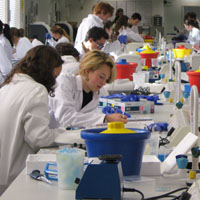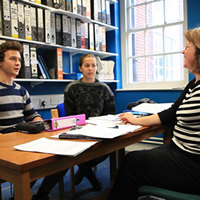The Natural Sciences course is both intensive and challenging, but we will provide you with an excellent learning environment in which to rise to this challenge. You will find that you have a full and structured timetable, and that you will be exposed to new ways of learning and studying. Each course will approach the teaching of material in different ways and you will be exposed to many different learning environments and conventions. You will have support from supervisors and Directors of Studies to help you to develop the most suitable way of working for you. To survive and thrive, you will need to be organised and self-disciplined.
Most courses use three approaches to teaching:
1. Lectures
Lectures are organised for the entire class and outline the content and scope of the course. While they do not cover everything you need to know, they offer a foundation for further exploration through practical work, supervisions, and independent reading.
It's crucial to attend lectures and actively engage with the material presented. Arrive prepared to take notes on key points and identify areas that may be unclear, so you can explore them further later.Most lecturers will provide you with some form of handout; handouts are not meant to replace the lecture, but are provided to give you "breathing space" to engage more closely with the lecture.
Handouts come in many forms:
| complete handouts - does the lecturer therefore want to you listen closely to what they are telling you? |
| "fill in the blanks" - is the lecturer drawing to your attention the more complicated aspects of the lecture, or highlighting particularly important points? |
| lecture outline - is this simply intended as an aide mémoire? |
Take appropriate action to get the most from the lecture...
Whatever the form of the lecture and handout, it is important that you take time to review and consolidate what you have learned. Look over your notes shortly (but perhaps not immediately) after the lecture - do they make sense? Supplement your notes from other sources, including the recommended texts and from extra information you learn in supervisions.
2. Practical work
Practical work, whether in the laboratory, the field, or through examples classes, is designed to reinforce lecture topics and equip you with the skills to apply concepts in practical or experimental settings. Approach each session with a positive attitude, ready to learn from the experiments or exercises. These sessions are purposeful, and it’s important to understand their objectives.
To make the most of your time, it's often helpful to prepare by reading relevant materials beforehand, especially where handouts are provided. During the class, take advantage of the demonstrators for guidance and support.
Practical work may be assessed continuously. If you're required to write up an experiment during class, ensure you understand the expectations—avoid unnecessary embellishments. If you need to complete the write-up afterward, do so promptly while the session is fresh in your mind. If issues arise, you can still seek assistance from the lab or your supervisor. Don’t wait until the last minute, as it may be too late to get the help you need.
3. Supervisions
Supervisions are small-group teaching sessions organised by your College, typically with two or three students, led by a member of your College. These sessions offer a chance to revisit material from lectures and practical classes, helping you clarify any areas of uncertainty.
Supervisions are a unique learning opportunity, so it’s important to use them effectively. Tailor the sessions to your needs—this is the ideal time to resolve any confusion from lectures or practicals and assess your understanding and progress.
Preparation is key. Complete the assigned work and submit it on time. Supervision tasks are not given just to keep you busy; they are designed to support your learning. If you encounter difficulties, submit what you can and include notes on the challenges you faced. This helps the supervisor tailor the session to address your needs. Prepare specific questions and ensure they are addressed during the session. The more you actively engage, the more you will benefit from supervisions.
Supervisors, in turn, are expected to mark your work and prepare for the session. If supervisions aren’t meeting your needs, don’t hesitate to contact your Director of Studies for support.
Still feeling lost?
Don't be afraid to ask for help. Talk to your colleagues - you will probably find you are not alone if you are missing something. Work in pairs or groups to solve supervision problems. Collaborate with peers to tackle supervision problems and seek advice from students in higher years, lecturers, supervisors, or postgraduates in College. Almost everyone finds the Natural Sciences Tripos challenging, so if someone claims otherwise, they may be underestimating the difficulty.
Be aware that the work style and expectations here differ significantly from what you experienced at A-level or similar qualifications. End-of-year exams are also different, with scores above 80% being quite rare; the average tends to be around 60%. For context on how marks are awarded, you can refer to the marking schemes published on the NST website.
